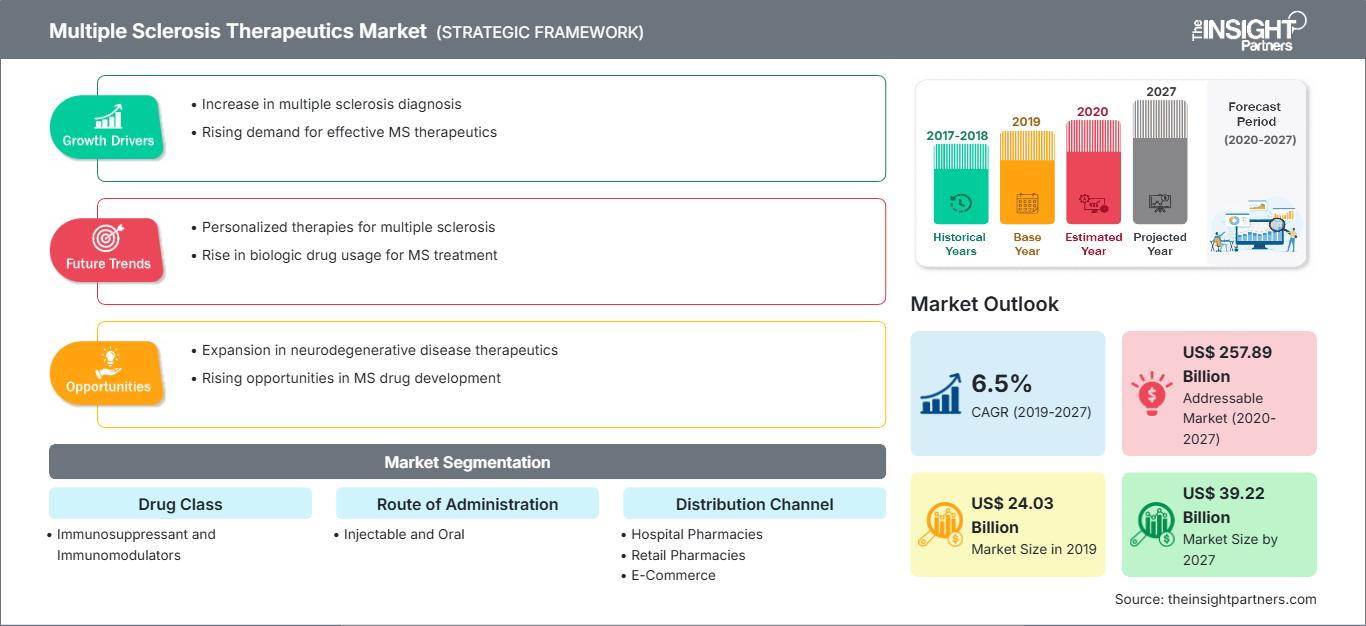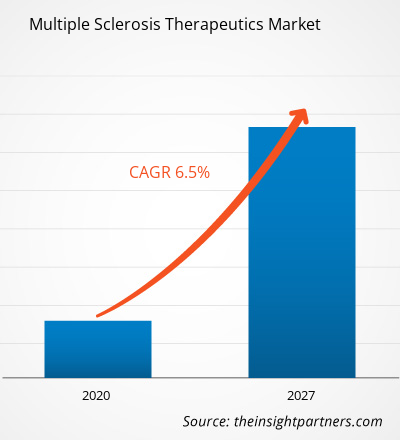Multiple Sclerosis Therapeutics Market Trends and Analysis by 2027
Multiple Sclerosis Therapeutics Market Forecast to 2027 - Analysis By Drug Class (Immunosuppressant and Immunomodulators), Route of Administration (Injectable and Oral), and Distribution Channel (Hospital Pharmacies, Retail Pharmacies, and E-Commerce), and Geography
Historic Data: 2017-2018 | Base Year: 2019 | Forecast Period: 2020-2027- Report Date : Feb 2021
- Report Code : TIPRE00004057
- Category : Life Sciences
- Status : Published
- Available Report Formats :


- No. of Pages : 169
The Multiple Sclerosis Therapeutics Market was valued at US$ 24,026.90 million in 2019 and it is projected to reach US$ 39,223.59 million by 2027; it is expected to grow at a CAGR of 6.5% from 2020 to 2027.
Multiple sclerosis (MS) is an autoimmune disease affecting the central nervous system. The immune system attacks the nerves, which causes communication problems between the brain and rest of the body. Immunosuppressant and immunomodulators, along with physiotherapy, are widely used to treat MS.
The scope of the multiple sclerosis therapeutics market includes drug class, route of administration, distribution channel, and region. The market for multiple sclerosis therapeutics is analyzed based on regions such as North America, Europe, Asia Pacific, Middle East & Africa, and South and Central America. The report offers insights and in-depth analysis of the multiple sclerosis therapeutics market emphasizing on various parameters, such as market trends, technological advancements, market dynamics, and competitive landscape analysis of leading market players across the globe.
Customize This Report To Suit Your Requirement
Get FREE CUSTOMIZATIONMultiple Sclerosis Therapeutics Market: Strategic Insights

-
Get Top Key Market Trends of this report.This FREE sample will include data analysis, ranging from market trends to estimates and forecasts.
Market Insights
Growing Prevalence of Multiple Sclerosis
Multiple sclerosis is a chronic disease that affects the brain, spinal cord, and optic nerves. The symptoms of multiple sclerosis include weakness, anxiety, abnormality of taste, reduced sensation, and blurred vision or vision loss. Some of the other signs are constipation, muscle stiffness, depression, thinking problems, and urinary problems.
Studies suggest that there is an increase in prevalence of multiple sclerosis across the globe. For instance, as per the National Multiple Sclerosis Society’s study in 2017, about 1 million adults (up to 913,925) were living with MS in the US. In 2010, estimated prevalence of the disease was 309 cases per 100,000 people, that is, there were 727,344 adults suffering from MS. Additionally, as per the Government of Canada, (2014–2015 estimates) over 77,000 Canadians are living with multiple sclerosis of which 3/4th are women.
Further, the Multiple Sclerosis Society estimated that about 110,000 people were suffering from the condition in the UK in 2018. It also mentioned that MS is more than twice prevalent in females than males. The number of new patients diagnosed per year is also increasing; it increased from 5,000 in 2017 to 6,700 in 2018.
Therefore, growing prevalence of multiple sclerosis is driving the multiple sclerosis therapeutics market.
Drug Class Based Insights
Based on multiple sclerosis therapeutics drug class, the multiple sclerosis therapeutics market is segmented into immunosuppressant and immunomodulators. In 2019, the immunomodulators segment accounted for larger share of the market. Growth of this segment is attributed to launch of new generic drugs and increase in adoption of immunomodulators in MS treatment. The immunosuppressant segment is likely to register higher CAGR during the forecast period.
Route of Administration Based Insights
In terms of route of administration, the multiple sclerosis therapeutics market is segmented into injectable and oral. The injectable segment held larger share of the market in 2019, and same segment is anticipated to register higher CAGR during the forecast period.
Distribution Channel Based Insights
Based on distribution channel, the multiple sclerosis therapeutics market is segmented into hospital pharmacies, retail pharmacies, and e-commerce. The hospital pharmacies segment held the largest share of the market in 2019, and the e-commerce segment is anticipated to register the highest CAGR in the market during the forecast period.
COVID-19 pandemic has become the most significant challenge across the world. This challenge will be frightening especially in developing countries across the globe as it will lead to reducing imports due to disruptions in global trade. Till date no definitive treatment against COVID 19 has been established. Patients with severe health conditions, such as neurological diseases and others; are witnessing delays in such chronic disease treatment. Supply chain disruptions associated with this pandemic situation will ultimately affect the sales of products for short period. However, the supply of MS drugs has been continuous in the pandemic as pharmacies are allowed to open during the lock down. Several companies are cutting their clinical trial activities and delaying product launches in response to the COVID-19 pandemic. For instance, Bristol-Myers Squibb delayed the launch of its multiple-sclerosis drug Zeposia (ozanimod) due to the outbreak of COVID-19 pandemic.
Product launches and expansion strategies are commonly adopted by companies to expand their footprint worldwide and meet the growing demand. These strategies are commonly adopted by the market players in order to expand its product portfolio.
The market players operating in the Multiple Sclerosis Therapeutics Market adopted the strategy of product innovation to cater to changing customer demand across the world, which also permits the players to maintain their brand name globally.
The regional trends and factors influencing the Multiple Sclerosis Therapeutics Market throughout the forecast period have been thoroughly explained by the analysts at The Insight Partners. This section also discusses Multiple Sclerosis Therapeutics Market segments and geography across North America, Europe, Asia Pacific, Middle East and Africa, and South and Central America.
Multiple Sclerosis Therapeutics Market Report Scope
| Report Attribute | Details |
|---|---|
| Market size in 2019 | US$ 24.03 Billion |
| Market Size by 2027 | US$ 39.22 Billion |
| Global CAGR (2019 - 2027) | 6.5% |
| Historical Data | 2017-2018 |
| Forecast period | 2020-2027 |
| Segments Covered |
By Drug Class
|
| Regions and Countries Covered |
North America
|
| Market leaders and key company profiles |
|
Multiple Sclerosis Therapeutics Market Players Density: Understanding Its Impact on Business Dynamics
The Multiple Sclerosis Therapeutics Market is growing rapidly, driven by increasing end-user demand due to factors such as evolving consumer preferences, technological advancements, and greater awareness of the product's benefits. As demand rises, businesses are expanding their offerings, innovating to meet consumer needs, and capitalizing on emerging trends, which further fuels market growth.

- Get the Multiple Sclerosis Therapeutics Market top key players overview
By Drug Class
- Immunosuppressant
- Immunomodulators
By Route of Administration
- Injectable
- Oral
By Distribution Channel
- Hospital Pharmacies
- Retail Pharmacies
- E-Commerce
By Geography
- North America
- US
- Canada
- Mexico
- Europe
- France
- Germany
- Italy
- UK
- Spain
- Rest of Europe
- Asia Pacific (APAC)
- China
- India
- South Korea
- Japan
- Australia
- Rest of Asia Pacific
- Middle East & Africa (MEA)
- South Africa
- Saudi Arabia
- UAE
- Rest of Middle East & Africa
- South America (SAM)
- Brazil
- Argentina
- Rest of South America
Company Profiles
- Merck & Co., Inc.
- Novartis AG
- Bayer AG
- Sanofi
- Bristol-Myers Squibb Company
- Horizon Therapeutics plc.
- TEVA PHARMACEUTICAL INDUSTRIES LTD
- Takeda Pharmaceutical Company Limited
- F. HOFFMANN-LA ROCHE LTD.
- Biogen
Mrinal is a seasoned research analyst with over 8 years of experience in Life Sciences Market Intelligence and Consulting. With a strategic mindset and unwavering commitment to excellence, she has built deep expertise in pharmaceutical forecasting, market opportunity assessment, and developing industry benchmarks. Her work is anchored in delivering actionable insights that empower clients to make informed strategic decisions.
Mrinal’s core strength lies in translating complex quantitative datasets into meaningful business intelligence. Her analytical acumen is instrumental in shaping go-to-market (GTM) strategies and uncovering growth opportunities across the pharmaceutical and medical device sectors. As a trusted consultant, she consistently focuses on streamlining workflow processes and establishing best practices, thereby driving innovation and operational efficiency for her clients.
- Historical Analysis (2 Years), Base Year, Forecast (7 Years) with CAGR
- PEST and SWOT Analysis
- Market Size Value / Volume - Global, Regional, Country
- Industry and Competitive Landscape
- Excel Dataset
Testimonials
The Insight Partners' SCADA System Market report is comprehensive, with valuable insights on current trends and future forecasts. The team was highly professional, responsive, and supportive throughout. We are very satisfied and highly recommend their services.
RAN KEDEM Partner, Reali Technologies LTDsI requested a report on a very specific software market and the team produced the report in a few days. The information was very relevant and well presented. I then requested some changes and additions to the report. The team was again very responsive and I got the final report in less than a week.
JEAN-HERVE JENN Chairman, Future AnalyticaWe worked with The Insight Partners for an important market study and forecast. They gave us clear insights into opportunities and risks, which helped shape our plans. Their research was easy to use and based on solid data. It helped us make smart, confident decisions. We highly recommend them.
PIYUSH NAGPAL Sr. Vice President, High Beam GlobalThe Insight Partners delivered insightful, well-structured market research with strong domain expertise. Their team was professional and responsive throughout. The user-friendly website made accessing industry reports seamless. We highly recommend them for reliable, high-quality research services
YUKIHIKO ADACHI CEO, Deep Blue, LLC.This is the first time I have purchased a market report from The Insight Partners.While I was unsure at first, I visited their web site and felt more comfortable to take the risk and purchase a market report.I am completely satisfied with the quality of the report and customer service. I had several questions and comments with the initial report, but after a couple of dialogs over email with their analyst I believe I have a report that I can use as input to our strategic planning process.Thank you so much for taking the extra time and making this a positive experience.I will definitely recommend your service to others and you will be my first call when we need further market data.
JOHN SUZUKI President and Chief Executive Officer, Board Director, BK TechnologiesI wish to appreciate your support and the professionalism you displayed in the course of attending to my request for information regarding to infectious disease IVD market in Nigeria. I appreciate your patience, your guidance, and the fact that you were willing to offer a discount, which eventually made it possible for us to close a deal. I look forward to engaging The Insight Partners in the future, all thanks to the impression you have created in me as a result of this first encounter.
DR CHIJIOKE ONYIA MANAGING DIRECTOR, PineCrest Healthcare Ltd.Reason to Buy
- Informed Decision-Making
- Understanding Market Dynamics
- Competitive Analysis
- Identifying Emerging Markets
- Customer Insights
- Market Forecasts
- Risk Mitigation
- Boosting Operational Efficiency
- Strategic Planning
- Investment Justification
- Tracking Industry Innovations
- Aligning with Regulatory Trends




















 Get Free Sample For
Get Free Sample For